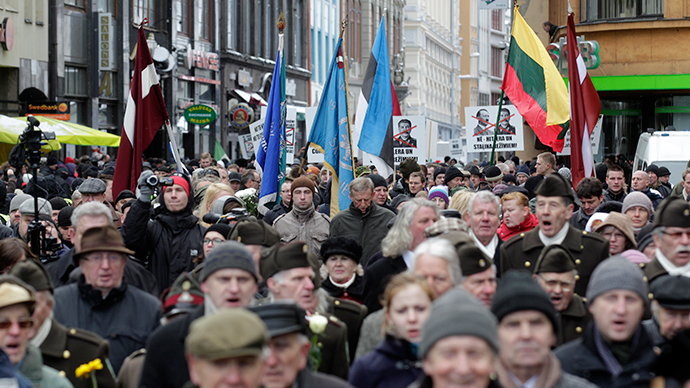Riga Nazi vets parade ‘reinterpretation of history for political purposes’

Whatever happened in the past, either during WWII or under the Stalin regime, cannot be used to justify present day politics, Lode Vanoost, former deputy speaker of the Belgian parliament, told RT, commenting on the Waffen SS veterans’ parade in Riga.
The annual march of Waffen SS veterans and their supporters was held Monday in the Latvian capital of Riga. The parade of the Latvian Legion veterans, a unit commanded by the Nazi SS during World War II, has taken place in Riga every year since 1991. Latvia's ethnic Russian community and several other groups claim it glorifies Nazism.
RT:What kind of message do you think these types of demonstrations send to the international community?
Lode Vanoost: I think these kinds of events whether they are in Latvia or in any other country, whether they are in my own country in Belgium, or in France or Holland, they all send the same wrong message, namely that you can find solutions to the current crises in an extremist reinterpretation of present day politics. It’s very bad that these kind of events get so much attention, get so much crowds gathering today.
RT:Latvian officials had to be specifically banned from these rallies and a minister was sacked last year for attending anyway. Why do you think the EU hasn’t put any pressure on Latvia over this, especially considering there has been European Commission and UN reports expressing concern about the situation?
LV: I think there is quite a simple explanation for this. There are no EU countries that are in a position to lecture Latvia - sadly enough - on this issue. I mean if you take Belgium, France, Holland and Italy, these countries have not come to terms with their own past. So they are not in a very good position to lecture Latvia which is not to say that what is happening in the Baltic countries is very bad indeed because… this is not just commemorating by people whether they were misguided or not. That’s not the issue. What is being done is political reinterpretation for present day politics. I mean if you talk about the Baltic countries, whatever happened in the past, whether they were under the regime of Stalin or under the German occupation, none of this justifies what is happening today with the discrimination of the ethnic Russian minorities in these countries. They are using historical events to justify present day politics. And this is where governments like the Latvian one, or like many others are going wrong because they are not distancing themselves from this reinterpretation of history for political purposes.
RT:We’ve seen an overall rise in nationalist sentiment all across Europe. Do you think marches like this could encourage other nationalist and far-right organizations to mobilize and make their presence known more?
LV: Obviously, demonstrations like this…do inspire other people to do similar things. This is what happens in present day life where the media inform everybody about what’s going on in the world most of the time, sadly without giving a proper context to put it into perspective. Obviously there is an influence in both ways because when things like that happen in one country, they encourage people do so in another country, and then the first country [gets] inspiration to do so again. This is something where governments and organizations within society should take responsibility to put these things in a correct perspective. And this is something that’s not being done.
RT:Germany itself has come to recognize the atrocities that have been committed by the Nazi regime. Do you see Latvia, and perhaps other nations, moving in the same direction in the future?
LV: Well, whether they will be moving in that direction, it’s hard for me to tell. It’s certainly something that they should be doing, which is another matter. The thing is - so far Europe has not really come to terms with its own past whether it was for WWII or for other events, for other cruelties that have happened.
Now there are precedents in another totally different context. The Truth Commission in South Africa and the Truth Commission in Central America did all the kind of things that you do when you really want to say “Ok, we will look at this and see what was the past and we will see how relevant these things are in the present.” That is something that should be done and it’s not being done for the moment for lots of reasons, political ones.
The statements, views and opinions expressed in this column are solely those of the author and do not necessarily represent those of RT.
The statements, views and opinions expressed in this column are solely those of the author and do not necessarily represent those of RT.












